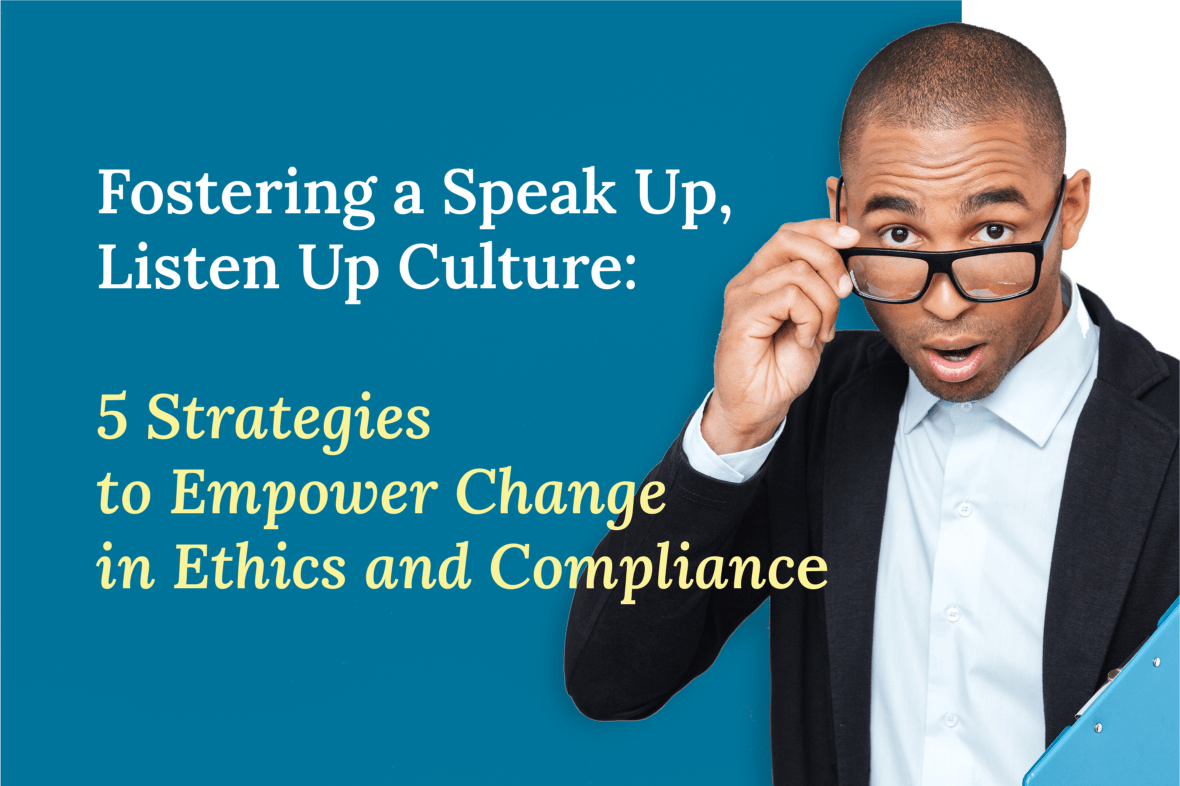Fostering a Speak Up, Listen Up Culture: 5 Strategies to Empower Change in Ethics and Compliance
Maintaining a robust ethical culture and ensuring compliance with regulations and standards is crucial for any organization’s long-term success. Unfortunately, negative perceptions of ethics and compliance can undermine trust and hinder progress. However, by actively addressing these perceptions, organizations can create positive change and foster a culture of integrity.
1. Transparency and Communication
Transparency is the cornerstone of building trust and credibility. Organizations should prioritize open and honest communication to alter a negative perception of ethics and compliance. Leaders should regularly communicate the importance of ethical behavior and compliance, emphasizing the positive impact on the organization, its stakeholders, and society. Transparently sharing information about compliance initiatives, policies, and training programs can help employees understand the organization’s commitment to ethical standards.
2. Leadership and Tone at the Top
Strong leadership is crucial in shaping the perception of ethics and compliance. Leaders must lead by example, demonstrating unwavering commitment to ethical conduct and compliance. When leaders prioritize ethics and compliance, employees are more likely to follow suit. Organizations should establish a “tone at the top,” emphasizing the importance of ethics, integrity, and compliance as non-negotiable values. When leaders consistently exhibit these behaviors, it positively influences employees and helps reshape negative perceptions.
3. Training and Education
Education and training are essential to altering negative perceptions of ethics and compliance. Organizations should invest in comprehensive training programs that educate employees about the organization’s code of conduct, relevant regulations, and potential ethical dilemmas. Employees can better understand the complexities of ethical decision-making by providing practical examples and interactive scenarios. Training should be ongoing and incorporate real-life case studies to enhance engagement and promote a culture of continuous learning.
4. Rewards and Recognition
Rewarding ethical behavior and compliance reinforces their importance and helps reshape negative perceptions. Recognizing and celebrating employees who consistently demonstrate ethical conduct and compliance can serve as positive reinforcement for others. This recognition can take various forms, such as awards, public acknowledgment, or incentives. By highlighting and rewarding those who exemplify integrity, organizations can motivate others to follow suit and contribute to a positive perception of ethics and compliance.
5. Continuous Monitoring and Improvement
Ethics and compliance initiatives should not be treated as one-time efforts. Organizations must engage in continuous monitoring and improvement to alter negative perceptions effectively. Regularly reviewing and assessing ethical practices, compliance procedures, and reporting systems can help identify areas for improvement. This ongoing evaluation demonstrates a commitment to maintaining high ethical standards and a willingness to adapt and grow. Soliciting employee feedback, conducting surveys, and establishing anonymous reporting mechanisms can also provide valuable insights to refine ethics and compliance programs.
Altering a negative perception of ethics and compliance is challenging but vital for organizations.
Organizations can transform their ethical culture and reshape perceptions by prioritizing transparency, leadership, training, rewards, and continuous improvement. Embracing these strategies fosters an environment where ethical behavior and compliance are valued and celebrated, ultimately leading to enhanced trust, stronger stakeholder relationships, and sustainable organizational success. Organizations can create a positive shift and cultivate a culture of integrity and responsibility.
Syntrio’s Ethics and Compliance Training can significantly alter an organization’s negative perception of ethics and compliance.
Here are a few reasons why Syntrio’s Ethics and Compliance Training is the solution:
- Comprehensive Content: Syntrio offers a wide range of training courses that cover various topics related to ethics, compliance, and workplace behavior. These courses provide employees with a solid understanding of ethical principles, legal requirements, and best practices. By delivering engaging and informative content, Syntrio’s programs help employees develop the necessary knowledge and skills to make ethical decisions and navigate compliance challenges.
- Interactive Learning: Syntrio’s training programs incorporate interactive elements such as real-life scenarios, quizzes, and case studies. This interactive approach ensures that learners actively engage with the material, enabling them to apply the concepts to their work environments. By simulating real-world situations, employees can practice ethical decision-making and understand the consequences of their actions. This hands-on approach promotes better retention and application of ethical principles.
- Customization and Tailoring: Syntrio understands that each organization has unique needs and challenges. Therefore, they offer customizable training solutions tailored to specific industries, company policies, and regulatory requirements. By aligning the training content with the organization’s context, employees can better relate to the material and understand its relevance to their daily work. This customization enhances the effectiveness of the training and its impact on altering negative perceptions.
- Ongoing and Adaptive Learning: Ethics and compliance training should not be limited to a one-time event. Syntrio’s programs are designed to provide ongoing learning opportunities, with the option for refresher courses and updates to reflect evolving regulations and industry standards. This approach ensures that employees stay updated with changing requirements and reinforces the organization’s commitment to continuous improvement in ethics and compliance. By promoting ongoing learning, Syntrio helps organizations maintain a positive perception of ethics and compliance over the long term.
- Reporting and Analytics: Syntrio’s training platform provides robust reporting and analytics capabilities. Organizations can track employee progress, completion rates, and quiz scores to assess the effectiveness of the training programs. These insights enable organizations to identify improvement areas and address gaps in understanding or compliance. The ability to generate reports and analytics demonstrates a commitment to transparency and accountability, reinforcing the organization’s efforts to alter negative perceptions of ethics and compliance.
In summary, Syntrio’s Training is the solution that provides comprehensive, interactive, customizable, and ongoing learning experiences that can significantly alter a negative perception of ethics and compliance. By leveraging these programs, organizations can effectively educate their employees, promote ethical behavior, and create a culture of compliance and integrity.
For more information about Syntrio’s Ethics and Compliance Training and other online training courses.
Resources
- Essential Guide to Creating Civil and Respectful Workplace
- Training to the Code: The Strategic Role of Annual Code of Conduct Training
- Developing a Code of Conduct Training Program: Step-by-Step Guide
- Training to the Code: The Strategic Role of Annual Code of Conduct Training
- Creating an Effective Code of Conduct Program


